Abstract
Cholesterol was linked to 2'-O-methyl-oligoribonucleotides (2'-OMe-RNA) via a disulfide bond by reacting the 3'-(pyridyldithio)-modified 2'-OMe-RNA with thiocholesterol in dichloromethane-methanol solution. This ligation reaction was made possible by a novel strategy in which the highly charged oligonucleotide was rendered soluble in nonaqueous solvent through conversion to a lipophilic amidinium salt. The biodegradable lipophilic modification of 2'-OMe-RNA resulted in a large increase in incorporation of such oligonucleotides into liposomes prepared by reversephase evaporation. Furthermore, association of these modified oligonucleotides with cultured TIB 73 cells was 100-fold higher than that seen with unmodified 2'-OMe-RNA in serum-free medium and about 10 to 30-fold higher in the presence of 10% calf serum. During incubation with cells, release of the internalized oligonucleotide from the thiocholesteryl moiety can be demonstrated.
Full text
PDF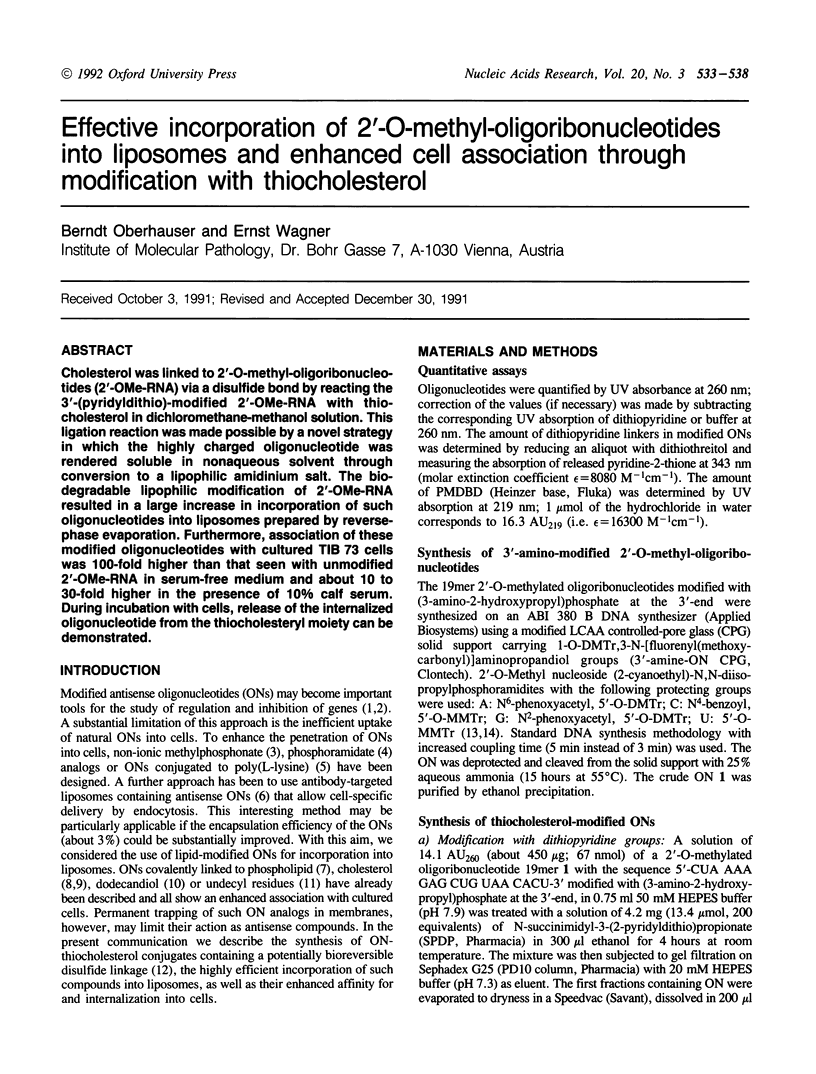
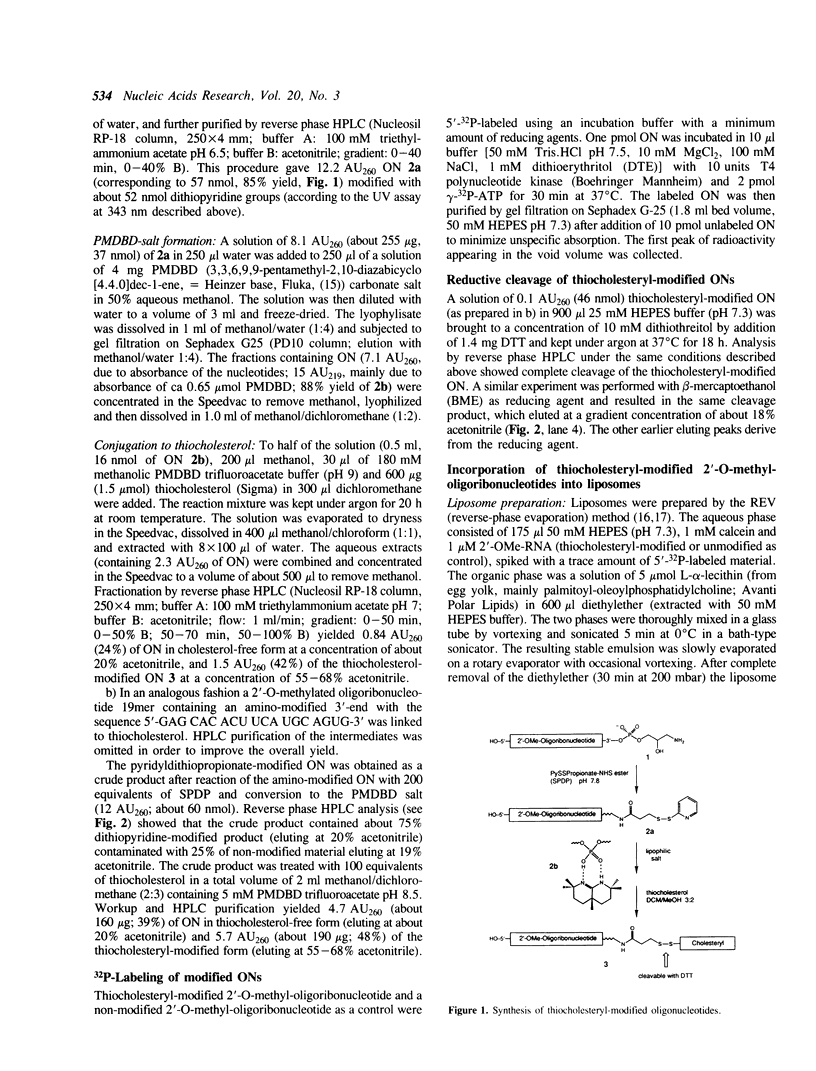
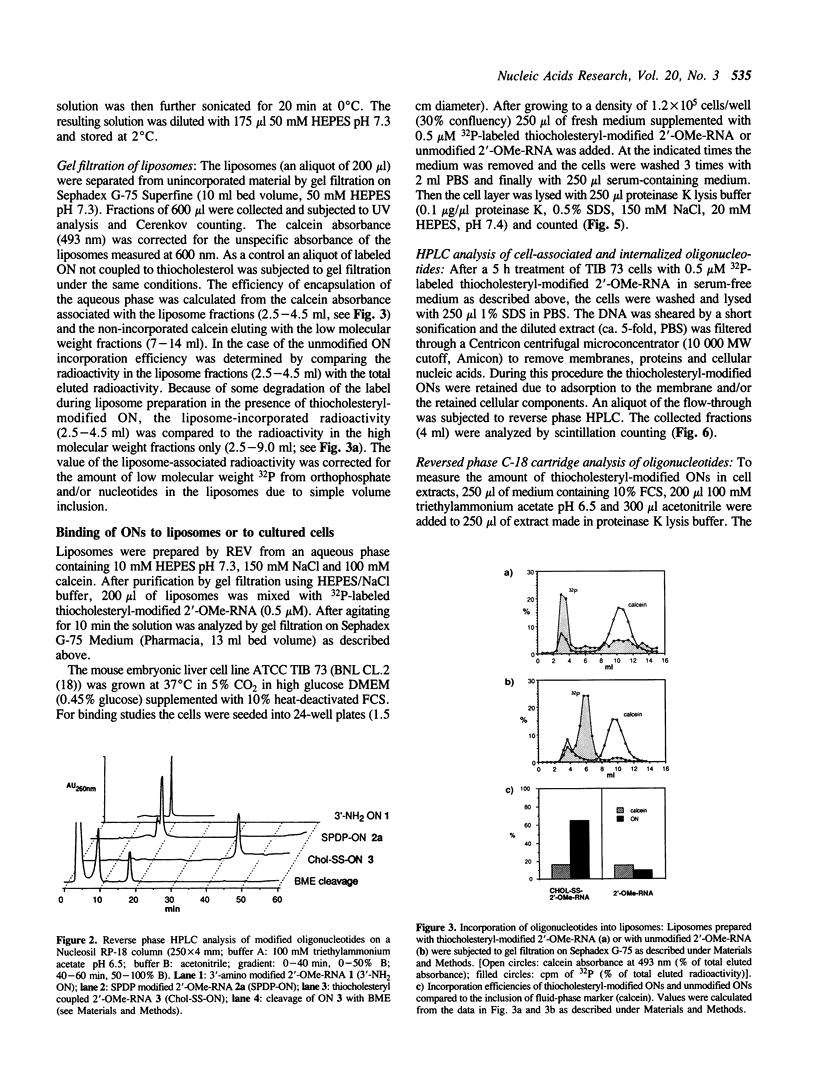
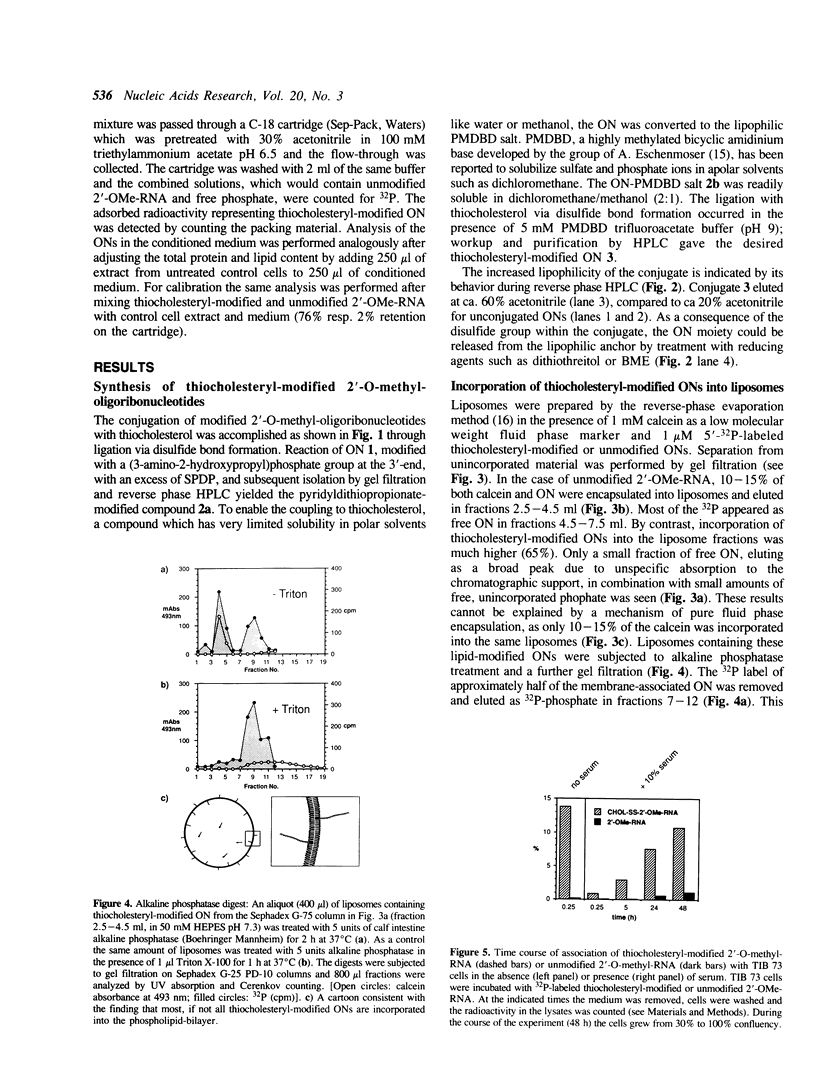
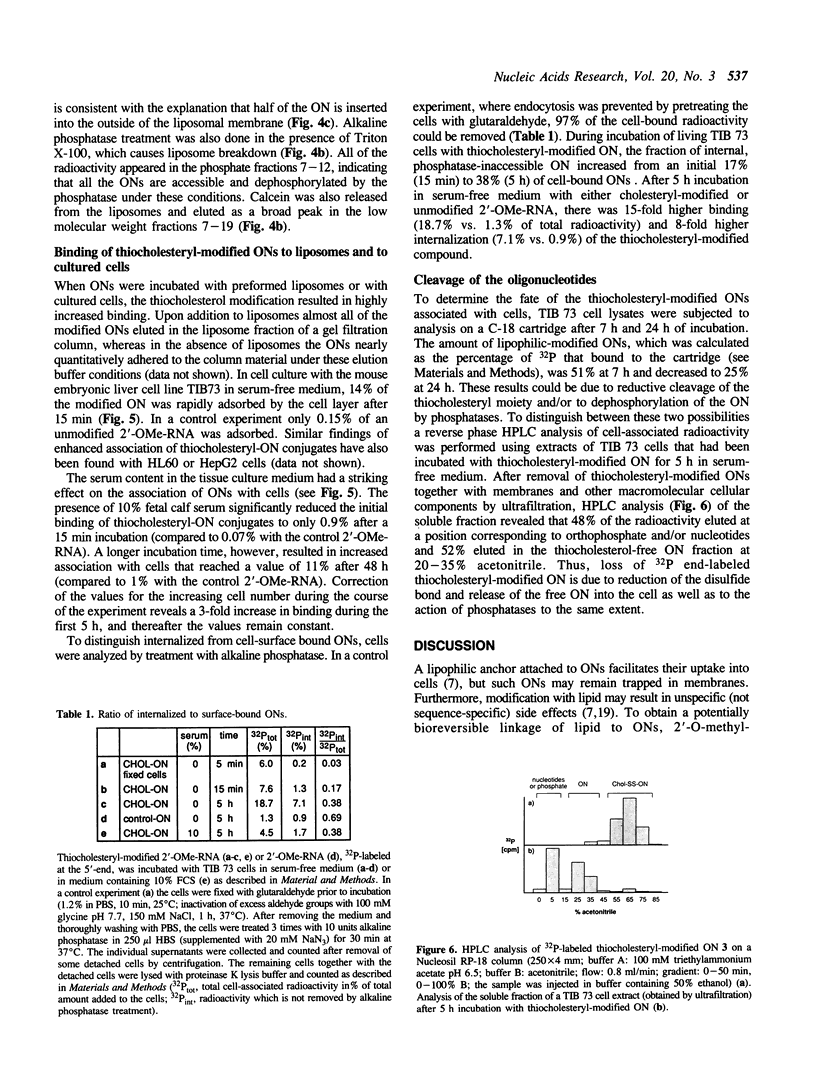
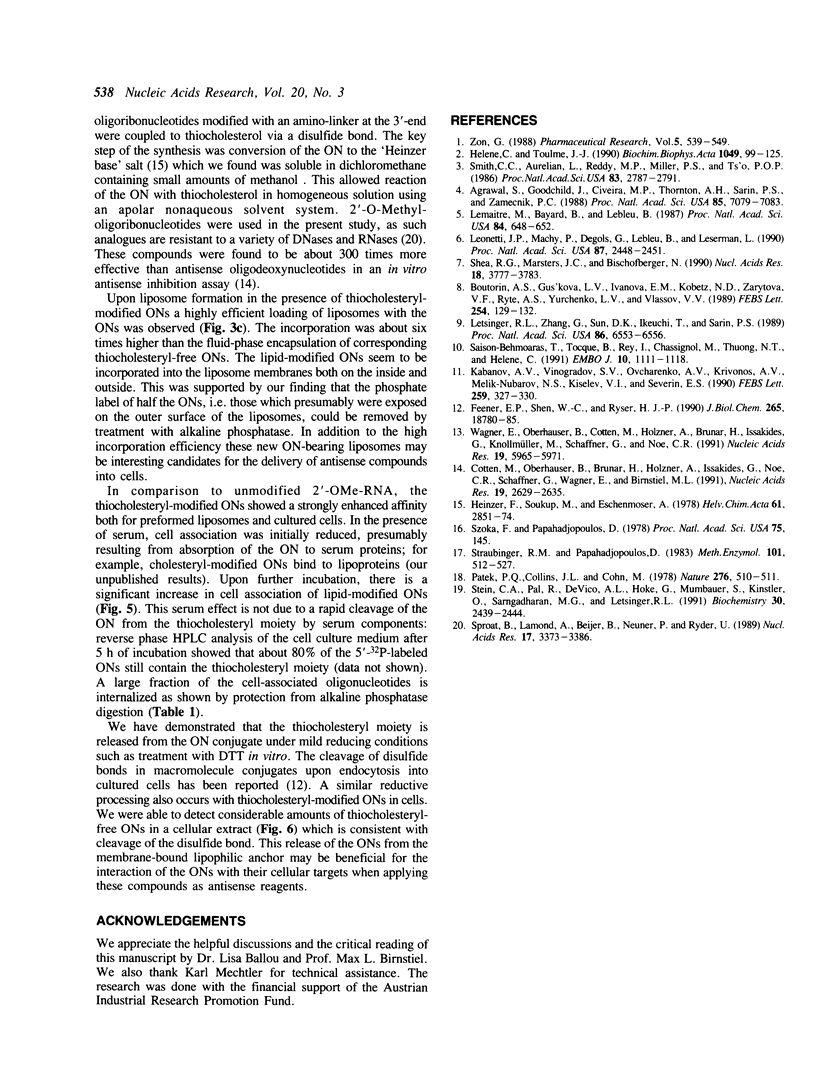
Selected References
These references are in PubMed. This may not be the complete list of references from this article.
- Agrawal S., Goodchild J., Civeira M. P., Thornton A. H., Sarin P. S., Zamecnik P. C. Oligodeoxynucleoside phosphoramidates and phosphorothioates as inhibitors of human immunodeficiency virus. Proc Natl Acad Sci U S A. 1988 Oct;85(19):7079–7083. doi: 10.1073/pnas.85.19.7079. [DOI] [PMC free article] [PubMed] [Google Scholar]
- Boutorin A. S., Gus'kova L. V., Ivanova E. M., Kobetz N. D., Zarytova V. F., Ryte A. S., Yurchenko L. V., Vlassov V. V. Synthesis of alkylating oligonucleotide derivatives containing cholesterol or phenazinium residues at their 3'-terminus and their interaction with DNA within mammalian cells. FEBS Lett. 1989 Aug 28;254(1-2):129–132. doi: 10.1016/0014-5793(89)81023-3. [DOI] [PubMed] [Google Scholar]
- Cotten M., Oberhauser B., Brunar H., Holzner A., Issakides G., Noe C. R., Schaffner G., Wagner E., Birnstiel M. L. 2'-O-methyl, 2'-O-ethyl oligoribonucleotides and phosphorothioate oligodeoxyribonucleotides as inhibitors of the in vitro U7 snRNP-dependent mRNA processing event. Nucleic Acids Res. 1991 May 25;19(10):2629–2635. doi: 10.1093/nar/19.10.2629. [DOI] [PMC free article] [PubMed] [Google Scholar]
- Feener E. P., Shen W. C., Ryser H. J. Cleavage of disulfide bonds in endocytosed macromolecules. A processing not associated with lysosomes or endosomes. J Biol Chem. 1990 Nov 5;265(31):18780–18785. [PubMed] [Google Scholar]
- Hélène C., Toulmé J. J. Specific regulation of gene expression by antisense, sense and antigene nucleic acids. Biochim Biophys Acta. 1990 Jun 21;1049(2):99–125. doi: 10.1016/0167-4781(90)90031-v. [DOI] [PubMed] [Google Scholar]
- Kabanov A. V., Vinogradov S. V., Ovcharenko A. V., Krivonos A. V., Melik-Nubarov N. S., Kiselev V. I., Severin E. S. A new class of antivirals: antisense oligonucleotides combined with a hydrophobic substituent effectively inhibit influenza virus reproduction and synthesis of virus-specific proteins in MDCK cells. FEBS Lett. 1990 Jan 1;259(2):327–330. doi: 10.1016/0014-5793(90)80039-l. [DOI] [PubMed] [Google Scholar]
- Lemaitre M., Bayard B., Lebleu B. Specific antiviral activity of a poly(L-lysine)-conjugated oligodeoxyribonucleotide sequence complementary to vesicular stomatitis virus N protein mRNA initiation site. Proc Natl Acad Sci U S A. 1987 Feb;84(3):648–652. doi: 10.1073/pnas.84.3.648. [DOI] [PMC free article] [PubMed] [Google Scholar]
- Leonetti J. P., Machy P., Degols G., Lebleu B., Leserman L. Antibody-targeted liposomes containing oligodeoxyribonucleotides complementary to viral RNA selectively inhibit viral replication. Proc Natl Acad Sci U S A. 1990 Apr;87(7):2448–2451. doi: 10.1073/pnas.87.7.2448. [DOI] [PMC free article] [PubMed] [Google Scholar]
- Letsinger R. L., Zhang G. R., Sun D. K., Ikeuchi T., Sarin P. S. Cholesteryl-conjugated oligonucleotides: synthesis, properties, and activity as inhibitors of replication of human immunodeficiency virus in cell culture. Proc Natl Acad Sci U S A. 1989 Sep;86(17):6553–6556. doi: 10.1073/pnas.86.17.6553. [DOI] [PMC free article] [PubMed] [Google Scholar]
- Patek P. Q., Collins J. L., Cohn M. Transformed cell lines susceptible or resistant to in vivo surveillance against tumorigenesis. Nature. 1978 Nov 30;276(5687):510–511. doi: 10.1038/276510a0. [DOI] [PubMed] [Google Scholar]
- Pfister K., Kägi J. H., Christen P. Syncatalytic conformational changes in aspartate aminotransferase determined by hydrogen-deuterium exchange. Proc Natl Acad Sci U S A. 1978 Jan;75(1):145–148. doi: 10.1073/pnas.75.1.145. [DOI] [PMC free article] [PubMed] [Google Scholar]
- Saison-Behmoaras T., Tocqué B., Rey I., Chassignol M., Thuong N. T., Hélène C. Short modified antisense oligonucleotides directed against Ha-ras point mutation induce selective cleavage of the mRNA and inhibit T24 cells proliferation. EMBO J. 1991 May;10(5):1111–1118. doi: 10.1002/j.1460-2075.1991.tb08051.x. [DOI] [PMC free article] [PubMed] [Google Scholar]
- Shea R. G., Marsters J. C., Bischofberger N. Synthesis, hybridization properties and antiviral activity of lipid-oligodeoxynucleotide conjugates. Nucleic Acids Res. 1990 Jul 11;18(13):3777–3783. doi: 10.1093/nar/18.13.3777. [DOI] [PMC free article] [PubMed] [Google Scholar]
- Smith C. C., Aurelian L., Reddy M. P., Miller P. S., Ts'o P. O. Antiviral effect of an oligo(nucleoside methylphosphonate) complementary to the splice junction of herpes simplex virus type 1 immediate early pre-mRNAs 4 and 5. Proc Natl Acad Sci U S A. 1986 May;83(9):2787–2791. doi: 10.1073/pnas.83.9.2787. [DOI] [PMC free article] [PubMed] [Google Scholar]
- Sproat B. S., Lamond A. I., Beijer B., Neuner P., Ryder U. Highly efficient chemical synthesis of 2'-O-methyloligoribonucleotides and tetrabiotinylated derivatives; novel probes that are resistant to degradation by RNA or DNA specific nucleases. Nucleic Acids Res. 1989 May 11;17(9):3373–3386. doi: 10.1093/nar/17.9.3373. [DOI] [PMC free article] [PubMed] [Google Scholar]
- Stein C. A., Pal R., DeVico A. L., Hoke G., Mumbauer S., Kinstler O., Sarngadharan M. G., Letsinger R. L. Mode of action of 5'-linked cholesteryl phosphorothioate oligodeoxynucleotides in inhibiting syncytia formation and infection by HIV-1 and HIV-2 in vitro. Biochemistry. 1991 Mar 5;30(9):2439–2444. doi: 10.1021/bi00223a020. [DOI] [PubMed] [Google Scholar]
- Straubinger R. M., Papahadjopoulos D. Liposomes as carriers for intracellular delivery of nucleic acids. Methods Enzymol. 1983;101:512–527. doi: 10.1016/0076-6879(83)01035-6. [DOI] [PubMed] [Google Scholar]
- Wagner E., Oberhauser B., Holzner A., Brunar H., Issakides G., Schaffner G., Cotten M., Knollmüller M., Noe C. R. A simple procedure for the preparation of protected 2'-O-methyl or 2'-O-ethyl ribonucleoside-3'-O-phosphoramidites. Nucleic Acids Res. 1991 Nov 11;19(21):5965–5971. doi: 10.1093/nar/19.21.5965. [DOI] [PMC free article] [PubMed] [Google Scholar]
- Zon G. Oligonucleotide analogues as potential chemotherapeutic agents. Pharm Res. 1988 Sep;5(9):539–549. doi: 10.1023/a:1015985728434. [DOI] [PubMed] [Google Scholar]


